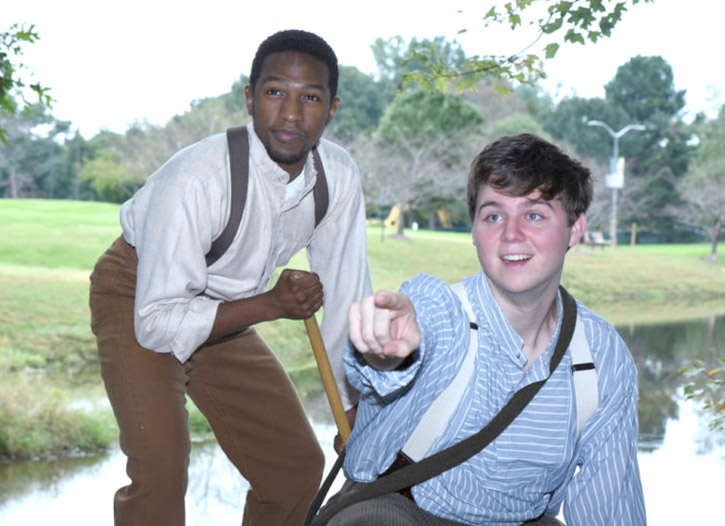
Garvey Dobbins (Jim) and Jeffrey Samuel Trent, Jr. (Huck) in Big River at George Mason University. Photo credit: R Kelberg.
By Chuck Leonard, DC Metro, Theater Arts
October 27, 2018The story is Huck’s, and the character narrates as well as sings many of the show’s best songs. Played by smooth-voiced Jeffrey Samuel Trent, Jr., Huck’s duets with the runaway slave Jim are among the show’s most poignant numbers. Garvey X. Dobbins, who has a deeply rich voice, makes the most out of the part of Jim, and the songs “Muddy Water” and “River in the Rain” each earn the reprises they later get in the show. While both characters are in fact lawbreakers, providing the moral conflicts that Huck faces, the real villains of the show are two con-men whose moral compasses are entirely absent.
Just as they remorselessly steal from all those around them, so too do the King (Drake Leach) and the Duke (Ryan Phillips) steal every scene that they appear in. “When the Sun Goes Down in the South” is a showstopper, offering Leach and Phillips the chance to show off their wonderfully-paired comic, dancing, vocal, and partnering skills. When Huck joins them in the number, it is the perfect ending for the first act.
The ensemble is the motor that keeps the show moving. Energetic and singing strongly, the rest of the cast moves sets, props and sings much of the story of the show. The strongest company number is “Do You Want to Go to Heaven,” giving nice vocal moments to Widow Douglas (Jessica Barraclough), Miss Watson (MacKenzie Cahill), and Judge Thatcher (Maderi), among others. Choreography by Jones, Stefan Sittig, and Assistant Choreographer Morgan Taylor included a fun number with the ensemble dancing with chairs.
The cast is accompanied by a 10-piece pit orchestra conducted by Joe Walsh, playing the multiple music styles needed, including Broadway, country ballad, bluegrass, minstrel, and gospel. The set design by Phil Male and Michael Cherry has staging that stretches over the sides of the pit, and a frame for the proscenium which presents pages from a novel. Sherrice Mojgani provides projections sparingly, used to show historical context for the story. Costumes by Alex Wiemeyer were consistently appropriate and appealing, while props designed by Alex Wade supported strong show moments. A five-foot catfish garnered an audience laugh, and the sheet held above Huck and Jim on their raft as they sing “River in the Rain,” provides a beautiful tableau.
As Dramaturg Jacob Horowitz writes, Twain’s classic is often described as the first modern masterpiece of United States literature. The book has both racial stereotypes and offensive language, and what is in the play may be found offensive by some (such as use of the n-word). Nonetheless, at its core is the story of friendship overcoming institutionalized racism, and Mason’s production attempts to tell a great story that respectfully opens the door to tough issues.
Running Time: Two hours and 50 minutes, with a 15-minute intermission.
Big River: The Adventures of Huckleberry Finn, presented by Mason's School of Theater and School of Music, played October 25-28, 2018, at George Mason University’s Center for the Arts, 4373 Mason Pond Drive, Fairfax, VA 22030.
Read the review on DC Metro's website.
